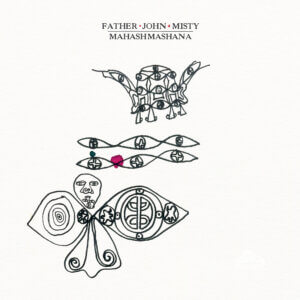
5.9
The Physical World
Death From Above 1979
Context shouldn’t have to be relevant for enjoying a record but it’s typically an unavoidable variable. For a band so synonymous for the scene in which they emerged, its’ especially difficult to not think of a new record from the band of what it is in 2014.
Death From Above 1979 released their debut album You’re a Woman, I’m a Machine in 2004, right when the aught dance punk craze was in its height. DFA79 offered a skuzzier version of the genre than most of its contemporaries. Stripped down to a distorted bass guitar and drums, singer Sebastien Grainger’s slick but punky vocals were embedded in a sound far more destructive than bands like the Rapture and LCD Soundsystem which gave them an edge, even if their record was not quite as essential as Echoes and LCD’s self-titled. When the duo broke up unexpectedly in 2006, it could have been viewed as a good career move for preserving their stature – they came along, played festivals, toured with Nine Inch Nails, and bowed out before anyone could have accused them of becoming stale.
Their split was due largely to the well-worn excuse of “creative difference” which is curious considering it’s hard to think of a bass/drums punk group sounding much of anything other than Death From Above. Now its ten years later and Grainger and bassist Jesse F. Keeler have since reconciled their differences to make their comeback record The Physical World. Listening to this record now, the differences between the two players can be heard more clearly, although it’s tough to say who wanted what out of the band.
Opening track “Cheap Talk” at first sounds like we’re down for another 35 minutes of chaotic skronk bass, yelping punk rock vocals, and blistering tempos, but it quickly changes gears for a record that feels more controlled and processed than its predecessor. Keeler’s bass is as dirty as ever, and the duo still play off each other fairly well, but the sound is almost too tight. Rather then threatening to fly off the hinges, the two sound rest-assured and deliberate. This is most evident in Grainer’s vocals which are clean, direct, and sometimes annoyingly polished. Have they always been like this, and has it just become noticeable because they have some more money to spend on production by Dave Sardy? Possibly, which is a shame, because some of these songs would sound a lot better if they were treated with a more fuck-all approach. “Government Trash” for instance is pure chaotic assault, but the clarity of the recording is a hindrance rather than a boost. It’s also frustrating considering Sardy has produced records in the past like Oasis’ raw rebrand record Don’t Believe the Truth, which was the antithesis of the group’s overwrought bloat.
Brutal punk records are definitely in with refreshingly destructive groups like Metz, the Men, and Perfect Pussy emerging over the last few years, but on this record, the best songs are the ones where the songwriting embraces the production. On the ballad(!) “White is Red,” the band slows it down to mid-tempo that maintains the fuzzy bass but uses it for a vibey track where the full sound helps make it a standout. “Trainwreck 1979,” the album’s first single also incorporates more synth and a jangly piano for a song that arcs well and vies for a glammy strut.
The Physical World is likely not the comeback record that the punks of ‘05 would be losing their shit over, but perhaps the fans that saw DFA play with Queens of the Stone Age at that time would dig this turn. The duo are still tight as hell and have a handful of worthy songs here, but this is an album that could have benefited from a little less work and a little more punk hunger.
http://lastgangentertainment.com/records
Doug Bleggi
Latest Reviews
Tracks
Related Albums
Related News
Advertisement
Looking for something new to listen to?
Sign up to our all-new newsletter for top-notch reviews, news, videos and playlists.









